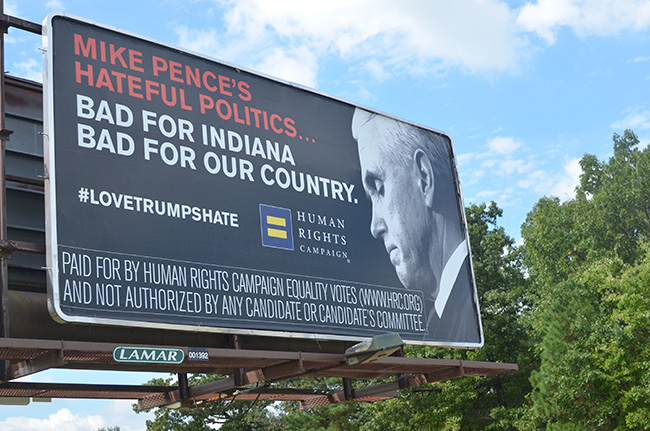National Institute for Civil
Discourse Releases Civility Index of Vice Presidential Debate
Research supports the need for NICD’s
recently-released set of Debate Standards
Washington, DC—The National Institute for Civil Discourse
(NICD) today released a civility index on the vice presidential debate,
concluding that both candidates fell short on civility. As it did for
the first presidential debate, NICD worked with Robert Boatright, NICD
Research Director and Professor of Political Science at Clark
University, and Timothy Shaffer, NICD Research Associate and Assistant
Professor of Communication Studies at Kansas State University to have
students measure incivility using a detailed research questionnaire.
In the questionnaire, respondents were asked to identify uncivil
acts such as direct insults, or a refusal to answer the moderator’s
questions, along with civil behaviors, such as a willingness to take
responsibility for past errors, or to denounce uncivil acts taken by
others. Questionnaire respondents had little trouble identifying
instances where the candidates insulted each other. They also found
many instances where the candidates called each other out for past
uncivil statements and behavior.
Students cataloged a variety of insults, interruptions, and other
uncivil behaviors on the part of both candidates. Findings include:
·
Seventy
percent
identified
instances
where
Tim
Kaine
insulted
Mike
Pence,
and
60 percent
identified instances where Pence insulted Kaine.
·
Respondents
reported
they
found
Pence
appeared
less
willing
than
Kaine
to
answer questions and to
take responsibility for the actions of his running mate.
·
Respondents
noted
that
Pence
frequently
called
out
Kaine
for
uncivil
behavior,
such as interruptions.
The major contrast between the vice presidential debate and the
first presidential debate, however, lay in the decision of both
candidates to insult someone other than their debate opponent:
·
Kaine
directed
most
of
his
criticism
at
Donald
Trump
rather
than
at Mike Pence, and Pence directed
a number of insults at Hillary Clinton.
There were also clearer partisan divisions among our respondents.
The students we had coding this debate were more Republican than those
who coded the first debate, and our Republican respondents were more
likely to find Kaine’s comments about Trump insulting. Many Democratic
respondents did not find these same comments to be uncivil. In
contrast, there was substantial agreement among Democrats and
Republicans on what constituted uncivil behavior in the first
presidential debate.
“After the rampant incivility of the first Presidential
Debate, I hoped that Senator Tim Kaine and Governor Mike Pence would
set a new standard of civility going forward. The research is clear and
the candidate unfortunately continued the troubling trend of uncivil
debates,” said Dr. Carolyn J. Lukensmeyer, Executive Director
of the National Institute for Civil Discourse.
“Our research continues to show that this election’s debates
are uncivil events, seemingly one of the few things something both
Republican and Democrats agree on this election,” said Robert
Boatright, NICD Research Director and Professor of Political Science at
Clark University.
The NICD civility questionnaire was completed by students at two
colleges and universities, chosen in order to achieve some variety in
the location of the schools, the type of school, and the ideological
composition of the student body. Students watched the debate together
and answered questions on civility as the debate progressed.
Additionally, City Clubs in Boise, Idaho and Cleveland, Ohio also
distributed the questionnaire to their members. NICD expects to repeat
the project in subsequent debates using other demographics and release
a report after the election benchmarking this year’s debates against
those of prior elections.
This research supports the need for NICD’s recently-released set of Debate
Standards
that, if adopted, would ensure that the debates are fair, informative,
and civil. NICD has shared the standards with the Commission on
Presidential Debates, presidential debate moderators, presidential
campaigns, as well as moderators and candidates in statewide elections.
“Even after the uncivil presidential and vice presidential
debates, I remain confident that, if the candidates and moderators
follow our Debate Standards, the remaining debates can be informative
sessions where Americans learn more about the candidates’ visions for
America. We must revive civility. Our democracy depends on it,” said
Lukensmeyer.
More than 75 organizations have already signed on to the standards,
including AARP; education institutions such as the Tufts University’s
Jonathan M. Tisch College of Civic Life, the University of California
Berkeley Center on Civility & Democratic Engagement and the
University of Virginia Center for Politics; civic forums, such as the
City Club of Cleveland and City Club of Portland; and faith
organizations, such as the Faith and Politics Institute and Interfaith
Alliance. A complete list can be found on NICD’s website: http://nicd.arizona.edu/.
NICD was formed at the University of Arizona with the goal of
improving civility in our political discourse in the wake of the
shooting of former Rep. Gabby Giffords. Earlier this year, NICD launched a national
campaign to #ReviveCivility.




